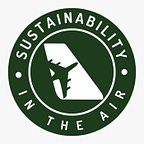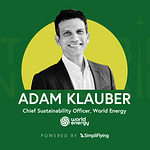In this episode of our 'Sustainability in the Air' podcast, Shashank Nigam, CEO of SimpliFlying, speaks with Tim Boeltken, Founder and Managing Director at INERATEC, a German e-fuels company. Boeltken shares insights into his company’s modular technology platform and the potential and promise of e-fuels to revolutionise the future of sustainable aviation.
Here are the key highlights of the conversation:
Understanding e-fuels and INERATEC's technology (0:39)
INERATEC's modular approach to e-fuel production (7:31)
The Frankfurt Pioneer Plant and scaling production (9:40)
Strategic partnerships in the e-fuel industry (16:46)
Future goals and scaling up production (31:05)
Technology pathways and flexibility in e-fuel production (29:18)
Rapid Fire! (32:45)
Keep reading for a quick overview of the episode.
Why “liquefied electricity” matters for the future of SAF
E-fuels, described by Boeltken as "liquefied electricity," offer significant benefits over other types of sustainable aviation fuels (SAF). Unlike first-generation biofuels, which compete with food crops, or second-generation biofuels, which rely on limited biomass resources, e-fuels offer a potentially unlimited and truly carbon-neutral solution.
This process effectively stores renewable energy in liquid form, hence the "liquefied electricity" moniker. "What we do is we produce these carbon-neutral liquid fuels out of green hydrogen and carbon dioxide," Boeltken explains.
The advantage of e-fuels lies in their versatility and compatibility with existing infrastructure. As Boeltken notes, "the liquid hydrocarbon can then be further refined into a diesel fraction, a gasoline fraction, or a kerosene fraction."
"With every ton of e-fuel we produce, we substitute one ton of fossil crude and we leave it in the ground."
Moreover, e-fuels have the potential to achieve greater emissions reductions than traditional SAF. This direct replacement of fossil fuels, coupled with the use of captured CO2 in production, makes e-fuels a compelling option for the future of sustainable flying.
Five ways INERATEC is envisioning the future of e-fuels
1. Modular production to solve scaling challenges
INERATEC's modular approach to e-fuel production is a key innovation in addressing the challenges of high production costs and scalability:
"Our technology is actually a modular synthesis unit, which can be built in our headquarters in Karlsruhe or at other places. It can be pre-manufactured. And these modules can be brought very quickly to the sweet spots for power-to-liquid production."
This approach allows INERATEC to overcome the "chicken and egg" problem of needing large-scale production to reduce costs, while also requiring lower costs to justify large-scale production. By starting small and scaling up, the company can gradually increase production while driving down costs through technological improvements and economies of scale.
"Wherever you build up like a wind park or where you have an electrolyser already running, you can build up these modules which have a perfect technical fit to the electrolysers," Boeltken says.
2. Technology platform and flexibility
INERATEC's technology platform is flexible in both feedstock utilisation and end-product generation.
"Our modular design allows us to efficiently convert various input materials into synthetic fuels and chemicals, adapting to local resource availability."
The platform's strength lies in its ability to process different types of feedstocks. "We can work with renewable electricity, green hydrogen, and captured CO2 from various sources. This flexibility allows us to take advantage of the most cost-effective or sustainable options in any given location," Boeltken explains.
On the output side, the platform can produce a range of e-fuels and chemicals, including sustainable aviation fuel, synthetic diesel, methanol, and other hydrocarbons. "We can adjust our production based on market demand, targeting the most strategically important sectors," says Boeltken.
He mentions that INERATEC’s adaptable platform can accelerate e-fuel adoption across various sectors by offering tailored solutions. “We're lowering barriers to entry and smoothing the transition to sustainable fuel alternatives," argues Boeltken.
3. Strategic partnerships
Boeltken says INERATEC's success is largely built on its strategic partnerships across the value chain.
"If you want to disrupt a field, especially the fossil industry, you need partners. You cannot do it alone."
The company has forged partnerships with key players like Safran for aviation expertise, Engie for renewable energy insights, and Synhelion for solar-to-fuel technology.
These collaborations provide INERATEC with more than just industry knowledge. They open doors to new markets, help in scaling up production, and provide crucial support in navigating the complex regulatory landscape of different countries. For instance, the partnership with Engie has been instrumental in INERATEC's expansion into the French market, providing insights into local renewable energy policies and potential project sites.
Moreover, these partnerships are not just about business growth. They're also about accelerating the overall transition to sustainable fuels. By working with established players in various sectors, INERATEC is helping to create a more integrated and efficient e-fuel ecosystem, from production to end-use.
4. Balancing present focus with future vision
While INERATEC is firmly focused on scaling up e-fuel production in the near term, Boeltken also articulates a compelling long-term vision for the company and the industry, particularly around maintaining a head start over the competition.
“Internally, we have set a goal to transform one gigawatt of electrical energy or renewable energy into approximately 125 million gallons of sustainable e-fuel by the beginning of the 2030s.”
This balance between present action and future ambition is crucial in an industry where long-term planning is essential, but immediate progress is also necessary. INERATEC's approach involves a step-by-step strategy, starting with their Pioneer Plant in Frankfurt, which will produce 2,500 tonnes of e-fuel annually.
The company is also investing in research and development to improve the efficiency of their production process and exploring new applications for e-fuels.
5. Addressing cross-sector demands
While aviation is a key target market for e-fuels, INERATEC is not putting all its eggs in one basket. Boeltken notes that there's strong interest from various sectors, including maritime, road transportation, and the chemical industry.
Interestingly, Boeltken states that aviation is currently lagging behind these other sectors in e-fuel adoption. He attributes this to factors such as higher price sensitivity in the aviation industry and longer decision-making processes. However, he remains optimistic about aviation as a future market, citing increasing quotas for sustainable fuels and the limited alternatives available for decarbonising the sector.
This multi-sector approach offers several obvious advantages:
First, it provides INERATEC with diverse revenue streams, reducing risk and enabling continued investment in technology development.
Second, it allows for cross-sector learning, where advancements made for one industry can potentially benefit others.
For instance, improvements in e-fuel production efficiency driven by demand from the maritime sector could ultimately lead to cost reductions that make e-fuels more attractive for aviation. Additionally, by serving multiple sectors, INERATEC can achieve economies of scale more quickly, potentially achieving cost parity with fossil-based Jet A fuel by 2030.
‘Sustainability in the Air’ is the world’s leading podcast dedicated to sustainable aviation. Through in-depth conversations with top aviation leaders, we break through the clutter and provide a clear roadmap for a net-zero future.













